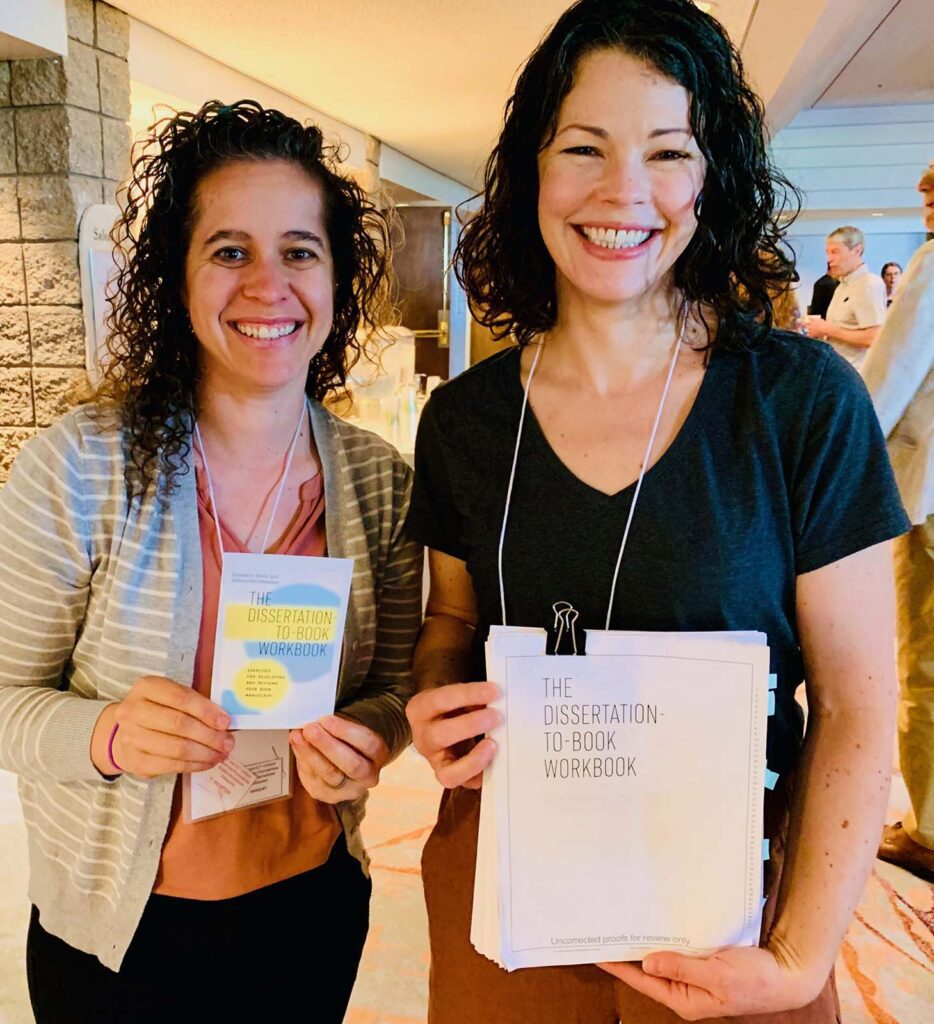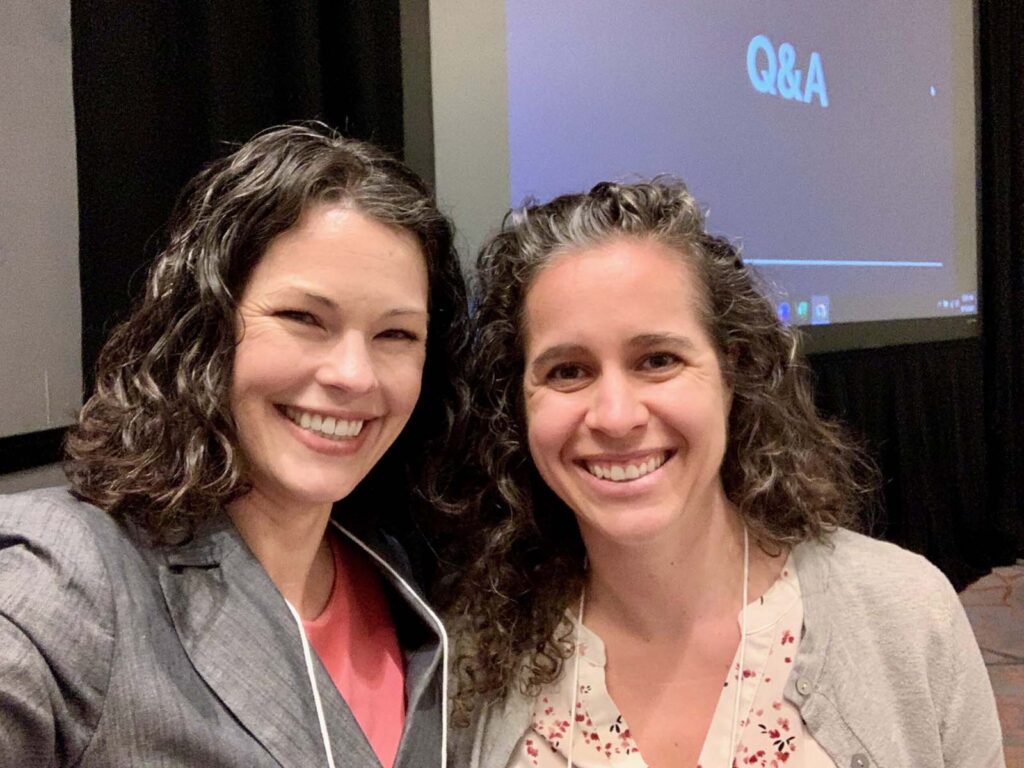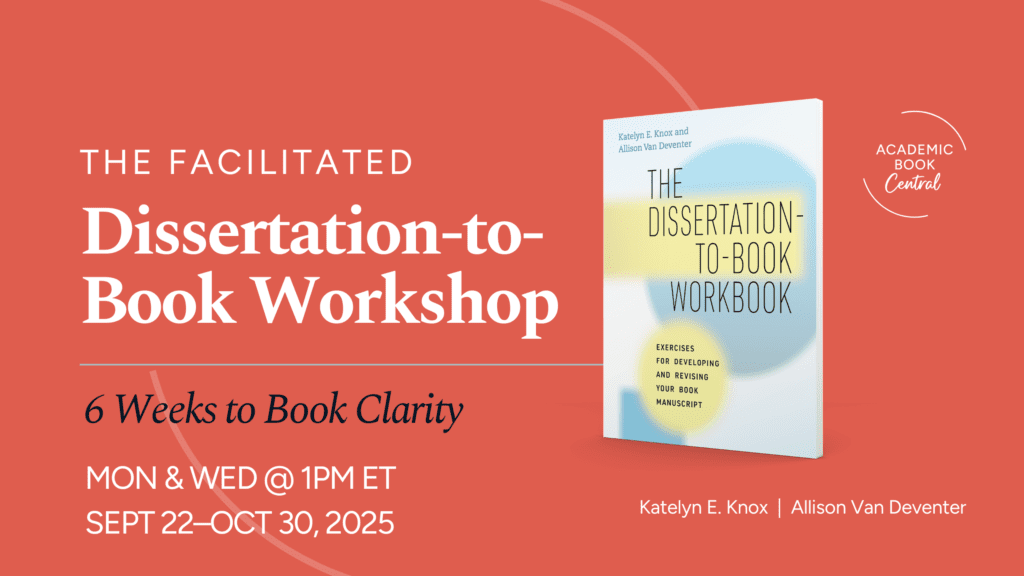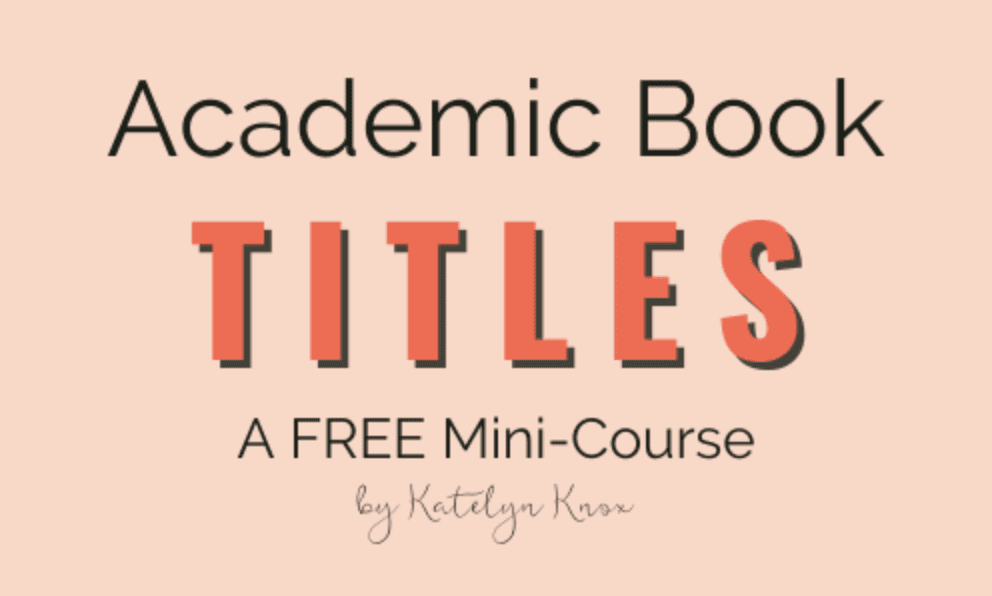About Us


We’re Katelyn and Allison, and we have years of experience helping scholars navigate the messy process of writing books. We met in graduate school and became friends and writing partners. Katelyn is an associate professor of French at the University of Central Arkansas, and Allison is a developmental editor who works with academic clients. Based on her experience of writing and publishing her first book with Liverpool University Press, Katelyn created an online curriculum for first-time book authors—what she wished had existed when she was going through the process—and brought Allison on board to help run it as a summer workshop conducted over Zoom.
In the workshop’s subsequent iterations, we tested the core exercises with hundreds of projects, brought to us by authors from all kinds of situations and with a wide variety of challenges. Based on what we learned, we repeatedly revised the curriculum. The result is The Dissertation-to-Book Workbook.
The Workbook
You’re writing your first academic book. You’ve read all the advice books; you’ve written a dissertation; you may even have attended webinars on how to write your proposal and pitch your book to publishers. You know you need to revise what you have. But when you sit down at your desk, what do you actually do?
The Dissertation-to-Book Workbook is the answer. In a series of practical, actionable steps, we show you how to distill your core argument, discover an organizational schema that works, and recognize what each chapter adds to the story. We even give you a method for drafting and revising new material. By the end, you’ll have a solid understanding of what you need to prioritize, how to thread your core ideas through each chapter, and what work remains to be done. If you’re looking for a way to grasp your book’s big picture and use what you learn to guide your revision process, this workbook is for you.
At the heart of this workbook is an unconventional process of developing your book argument using what we call “book questions” and “chapter answers”: two or three core questions that receive a one-sentence answer for each chapter. This framework, as you’ll see, is a powerful tool for aligning your book’s evidence with its claims.
Workshops for Individual Book Authors
6-Week Dissertation-to-Book Workshop Cohort: Mon & Weds @ 1 PM ET Sept. 22-Oct. 31, 2025

In this facilitated 6-week Dissertation-to-Book Workshop, you’ll work alongside a cohort of authors to get clarity on your book’s argument and ensure it’s threaded throughout your chapters. Each week, on Monday and Wednesday from 1-2 Eastern (10-11 Pacific), Allison or Katelyn will meet with the cohort to help you navigate the week’s work, give you real-time support and guidance, and answer your questions. We’ll also be there with you, answering your real questions in the course discussion board as you work.
You will need a copy of The Dissertation-to-Book Workbook to participate. We will work through chapters 1-13. Chapters 14 and 15 correspond more closely to our Chapter Shortcut cohort.
FREE Identifying Your Audience and Finding a Publisher Workshop: Sept. 5, 12-1:30 pm Eastern
In this hands-on workshop, you’ll leave with:
- A clear sense of your book’s primary and secondary audiences
- Confidence that your book won’t be rejected by editors or peer reviewers because you’ve mis-identified your audience
- An understanding of how to accommodate your primary and secondary audiences in your monograph’s prose (don’t frustrate your primary audience or alienate your secondary audiences!)
- A list of which publishers in your discipline actually publish books like yours
- Material you can use to draft your book proposal’s “audience” and “fit” sections
A recording will be circulated to registrants after the event.
Other Workshops
We regularly give workshops on various topics related to book project conception, manuscript revision, and book publishing for individual book authors. Enter your email below, and we’ll let you know when future registrations open!
Recent Workshop Replays
Dissertation-to-Book Workshop
- Learn what really distinguishes a dissertation from a book
- Clarify whether and how your book’s structure works for its argument
- Articulate your book’s and chapters’ main claims
- Prioritize your voice and banish dissertationese
Book Questions, Chapter Answers
- Articulate and sharpen your book’s argument
- Thread your argument throughout your chapters
- Clarify whether and how your book’s structure works for its argument
- Tweak how you frame your book’s argument to generate a narrative arc
Interested in inviting us to your institution or conference? Check out the institutional workshops we offer.
Free Resources

In this free course, I distill lessons from a broad survey of 188 monograph titles. You’ll learn:
- Exactly how many words your title should be (on average, your title should fit in an extremely narrow range of only 2 words!)
- Whether you need to coin a catchphrase for your book’s title (and whether your catchphrase actually works as a title)
- The specific elements your book title needs to include
- How to order all of the elements in your book’s title
- How to make your book title “search-friendly” (this was something that tripped me up bigtime)
In this round table with series and acquisitions editors, you’ll learn:
- What, exactly, editors are looking for in a project
- The biggest problems editors see in first book projects
- How to know whether your book is a good fit for a press
- Practical dimensions of talking to editors and ensuring the manuscript aligns with disciplinary expectations
Or, check out our blog post categories or all blog posts.